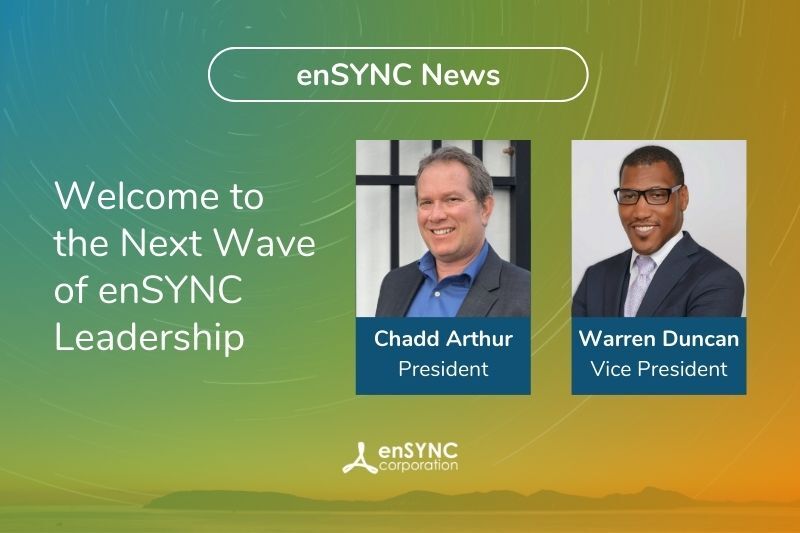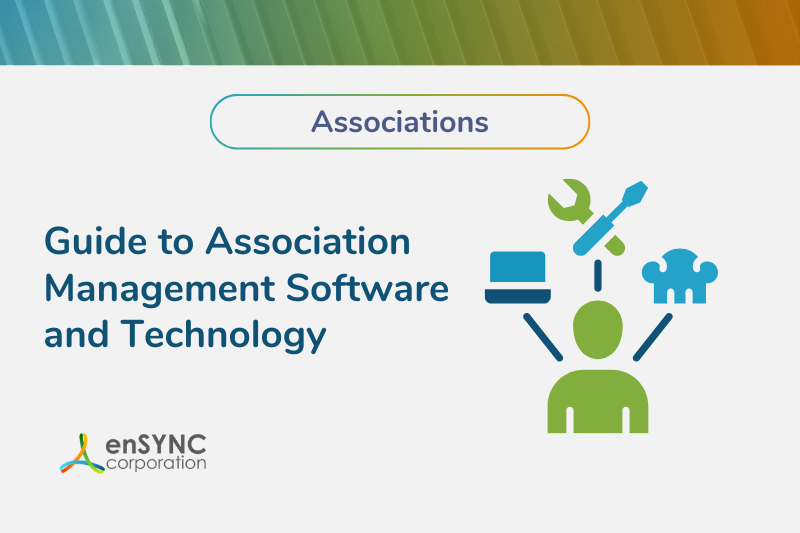Senior living | Nonprofits
Sounding Off: Lessons in Leadership, Loyalty, and Nonprofit Sustainability
July 2, 2025
|-3.png?)
We’re kicking off Sounding Off: Senior Living Execs on Tech, a new interview series exploring how senior living leaders at nonprofits are embracing technology to shape the future of care.
To launch the series, Josh Kozinski, enSYNC's Director of Business Development, sat down with Justin Kimbrell, CEO of Grace Village Retirement Community, Winona Lake, Indiana. Grace Village — which has 360 residents — includes condominiums, independent living apartments, assisted living, health care and short-term rehabilitation.
At Grace Village, Justin Kimbrell can hardly step outside his office without being stopped for hugs or warm hellos. His connection to senior care runs deep, having grown up accompanying his mother through her own lifelong career in the field.
“My mom became a director of nursing in a local nursing facility nine days before I was born – and was back to work nine days after I was born,” Justin says. “I spent a lot of time with her calling bingo when I was a kid and going to resident proms. When I could finally work there, I became a dishwasher and just kind of kept moving up the ladder.”
Now, as a CEO, Justin brings a strong sense of presence and purpose to his work. He isn’t just a leader; he’s a neighbor, a friend, and someone whose calling to care is felt in every hallway.
“I really never even thought about other industries,” he says. “Senior living is part of my heart and part of my being.”
That heart for community came through clearly in our conversation. Here are some of the highlights.
Feel free to jump around to a section of interest!
- Building a Beloved Community and Culture
- Achieving Financial Sustainability in Nonprofit Senior Living
- Constant Improvements and Growth in Nonprofit Senior Living
- Technology’s Role in Senior Care
- Lightning-round Questions
Highlights of the Interview
Building a Beloved Community and Culture
Josh: When you visit Grace Village, you immediately get a sense of the unique culture there the minute you walk through the door. Can you talk about that culture?
Justin: We have some core values here at Grace Village:
Residents first.
Bring joy — because happiness can come and go, but joy is impermeable. You can see it. You can feel it.
Serve wholeheartedly, always making sure that we're there for our residents.
Being faithful stewards.
With each one of those core values, we have a biblical scripture and that's something that’s needed. We run decisions through those core values to make sure we're not missing who we are. It takes time to build a culture like that. I've been blessed to be here for five years now and it was never always easy.
Josh: How did you build that culture over the years?
Justin: We've been really lucky to build a fantastic team over the years led by our values. When we're hiring, we want people with the right heart. You can train and teach tasks, but if you don't have the right heart in this industry, it is challenging.
People often say, ‘How do you work in an industry where it’s sad at times. You have to see residents pass away.’ And I always say: Never guard your heart; always keep it open. We take pride in making sure that we’re there for our residents even on their hardest days.
Achieving Financial Sustainability in Nonprofit Senior Living
Josh: I want to transition to some of the challenges the senior living community is facing. How would you describe the current financial landscape for nonprofits and senior living communities?
Justin: That's one of the biggest challenges in our industry. We have very small margins in the nonprofit world, and if you're not able to make certain changes, places are being acquired by for-profits. Sometimes, you have to make hard decisions and constantly look at how you can streamline things. How can you be more efficient while also making sure that you have the adequate staff that are happy?
There's a three-prong approach to long-term care. You want quality care for your residents, you want happy employees, and you need financial stability.
If you focus on these three areas, you'll make the money in the end. But if you get near-sighted and only look at the finances, you could lose those aspects and your residents will feel it. So I always try to make sure we're always balanced.
For example, when I first came here, we had financial issues right off the bat, and COVID was a major factor. I reduced our management size, but I didn't change our staffing on the floor. I did not want our residents to feel that change. Leaders could take more on our shoulders, but I didn't want our residents to feel the pain of our financial issues.
We're really fortunate — we are the highest-staffed facility in our county. We're really proud of that because we make sure we have the money in the right places. And in the nonprofit realm, the profits go right back into your buildings, your residence, and your employees.
Josh: Now the good old-fashioned question: As the executive director at Grace Village and a nonprofit in senior living, what keeps you up at night?
Justin: Being a standalone campus, we need to make sure our revenue is exceeding our expenses. For quite a few years prior to me coming here, we were on a downward slide. And that happens in the nonprofit industry.
In 2020, when I had to reduce our management staff, we all had to take on more responsibilities, and I gave myself a cut in pay, we were at a pivotal point. A few months later, one of my managers said, “We're getting more stuff done with less people.” And I said, “That's right, because we're a good team.” I think that's always the biggest thing: making sure we're building our team members up and making sure the staff are feeling appreciated. Happy employees give good care.
Josh: When you came on board at Grace Village, what steps did you take to improve the financial position and get staff on board?
Justin: The first thing was diving through the expenses — seeing what low-hanging fruit there was and making these quick changes. But tied to that, there were rumors among staff that we weren't doing well, and when you don't have information, sometimes you fill it with the worst-case scenario. It's good to be transparent with staff because, as you're making reductions in certain areas or eliminating a certain expense or vendor, they understand the backing behind it.
At the same time, you can't only focus on expenses. Revenue in your census is critical. We had to be more open to the healthcare side and take on certain residents that, in the past, would not have been considered.
One of my biggest triggers is: “This is how we've always done it.” Having a fresh eyes approach is nice. I came in from the outside, and it would have been more difficult for me to make these kinds of changes when I was working with my mom back at the facility.
Constant Improvements and Growth in Nonprofit Senior Living
Josh: What are your tips for helping a four-star community get to that five-star?
Justin: To be a five-star, it takes dedication and continuous improvement — always looking for the little things to improve upon.
We're constantly working on improving quality measures. I always make sure our staffing ratios are the highest because that directly helps our residents. Obviously, labor is your biggest expense, but I know that the quality outcomes from it will end up being good for our residents.
To achieve five stars, it’s also important to focus on your health inspections. Health inspections are difficult because the same surveyor sees the same thing year after year, but all of sudden you might get a citation one year. I always make sure we have our survey readiness together. You really should just be operating as if you're having a survey every day.
Technology’s Role in Senior Care
Josh: How has technology supported different aspects of Grace Village from finance to operations and beyond?
Justin: The hard part for technology in our industry is budget constraints. Our margins are very thin. To take on a large expenditure, you have to make sure you get the most bang for your buck.
An example that comes to mind is our electronic medical records system. Our former platform was inefficient, took up a lot of time, and was not user-friendly. When we made the change, we invested in it. It was more expensive per month, but it allowed our nursing staff to chart more efficiently, which freed them up to be able to be on the floor more to take care of the residents.
We continue to embrace technology throughout the whole campus. We've been looking at updating our general ledger software. We also have a lot of cameras in hallways. So for example, if someone fell, you could see the issue and better investigate things.
In the future, we’re looking at technologies that can help residents stay connected with their families. For example, having Amazon Alexas in resident rooms is an easy way for residents to chat with their loved ones — and that brings joy to their day.
When it comes to future technology, I try to keep an open mind. Who knows what will come, with all of the AI advancements? The thing about technology is whether it can make things more efficient or good for our residents. If the technology speaks to the core values of Grace Village, then that's a great thing for our residents.
I actually like to bounce ideas off my children. My daughter Grace is 14, and my son Fletcher is 12. It's great hearing their perspective as an outsider. One time I was bouncing an idea off my son and he just stopped me and said, ‘Dad, which one's best for your residents?’ I thought, ‘Wow! You're thinking of such a great angle.’ It’s great to have outside opinions and good counsel.
Lightning-round Questions
Check out Justin’s quick responses to our hot-seat questions.
Josh: If you were to share one piece of advice with your peers in the senior living industry, what would it be?
Justin: Always keep your integrity.
Josh: Why is financial planning critical to senior care?
Justin: Sustainability.
Josh: What's one piece of technology you couldn't run Grace Village without?
Justin: Electronic medical records.
Josh: What do you want residents or members to feel when they live at Grace Village?
Justin: I always want them to feel loved.
Josh: If you could debunk one myth about nonprofit senior living, what would it be?
Justin: It can be done. I think a lot of people feel hopeless that they can't make ends meet, and they can.
Josh: Finish this sentence: The best part of leading Grace Village is …
Justin: My residents and staff.
We’ve got more upcoming interviews with senior living leaders in the pipeline, so stay tuned as we continue our Sounding Off series for more on technology and leadership in the industry!
We Want to Hear From You!
Enjoyed this conversation? Have insights of your own? Be part of Sounding Off as a guest, or just come along for the insights we gather. To keep up to date, follow enSYNC and Josh Kozinski on LinkedIn, and check out all the details on Sounding Off: Senior Living Execs on Tech.

Meet Josh Kozinski, the Director of Business Development at enSYNC. With expertise in Sage Intacct, iMIS, and supporting technologies, Josh’s mission is to simplify complex processes by transforming rogue spreadsheets and databases into streamlined, automated solutions. His dedication to delivering strategic solutions aligns perfectly with enSYNC’s commitment to efficient and innovative nonprofit management. Josh is not just a leader at enSYNC; he’s actively involved in prominent industry organizations. By staying connected with these networks, Josh remains at the forefront of industry trends and best practices. In addition to his professional pursuits, Josh serves on the Membership Committee for the Dallas Fort Worth Association Executives, giving back to the industry he’s passionate about. Away from the office, Josh is an athlete at heart. He pursued his college education at Central Michigan, where he played basketball. However, what Josh values most are his relationships with his family and his faith in God. Josh is always open to discussions, whether you’re seeking innovative solutions for nonprofit management, exploring industry trends, or simply connecting with like-minded professionals.
Recent Posts

enSYNC Corporation Announces New Leadership as It Celebrates 30 Years
enSYNC Corporation, a national award-winning technology partner to mission-based organizations, has appointed Chadd Arthur as President and Warren...

Guide to Association Management Software and Technology
Managing associations, with their many moving parts, is a complicated process to say the least. To streamline these complex operations, modern member...
Enjoying our blog?
At enSYNC, we want to empower associations and nonprofits to make well-educated decisions. If you want our industry knowledge (and other free guides) sent directly to your inbox, fill out the form below.


